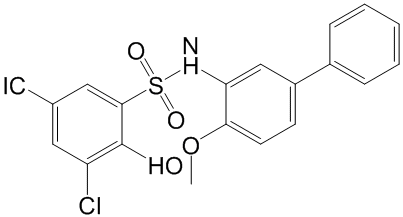All AbMole products are for research use only, cannot be used for human consumption.

BMS303141 blocks lipid synthesis (IC50 = 8 μM in HepG2 cells). Under identical incubation conditions, BMS-303141 showed no cytotoxicity up to 50 μM, indicating the observed inhibition of lipid synthesis was not a result of compound-induced cytotoxicity. BMS303141 Lowers plasma glucose and triglycerides in a mouse model of hyperlipidemia. BMS303141 is Orally bioavailable.

J Cell Mol Med. 2024 Mar;28(6):e18129.
SIRT2-mediated deacetylation of ACLY promotes the progression of oesophageal squamous cell carcinoma
BMS303141 purchased from AbMole
| Cell Experiment | |
|---|---|
| Cell lines | |
| Preparation method | |
| Concentrations | |
| Incubation time | |
| Animal Experiment | |
|---|---|
| Animal models | BALB/c nude mice (4‐5 weeks old) injected HepG2 cells |
| Formulation | saline |
| Dosages | 5 mg/kg/d for 8 days |
| Administration | gavage |
| Molecular Weight | 424.3 |
| Formula | C19H15Cl2NO4S |
| CAS Number | 943962-47-8 |
| Solubility (25°C) | DMSO ≥ 20 mg/mL |
| Storage |
Powder -20°C 3 years ; 4°C 2 years In solvent -80°C 6 months ; -20°C 1 month |
[2] Ma Z, et al. J Lipid Res. A novel direct homogeneous assay for ATP citrate lyase.
| Related Products |
|---|
| DSPE-PEG-FA
DSPE-PEG2K-FA is a PEG derivative containing folic acid. DSPE-PEG2K-FA has a targeting effect and can bind to folic acid receptors in cancer cells. DSPE-PEG2K-FA forms micelles/lipid bilayers and can be used in research on targeted drug delivery systems. |
| Lifastuzumab
Lifastuzumab is a humanized anti-NaPi2b IgG1 monoclonal antibody. |
| GPVI antagonist 1
GPVI antagonist 1 is a glycoprotein VI (GPVI) platelet receptor antagonist. GPVI antagonist 1 inhibits collagen-induced platelet aggregation with an IC50 of 25.3 μM. |
| MPSD TFA
MPSD TFA (MARCKS-ED TFA) is a 25-amino acid peptide based on the effector domain sequence of the intracellular membrane protein myristoylated alanine-rich C-kinase substrate (MARCKS). MPSD TFA can sense membrane curvature and recognize phosphatidylserine. MPSD TFA can be utilized as biological probe to study membrane shape and lipid composition. |
| 4-Nitro-2,1,3-benzoselenadiazole
4-Nitro-2,1,3-benzoselenadiazole is a biochemical material that can be used in scientific research. |
All AbMole products are for research use only, cannot be used for human consumption or veterinary use. We do not provide products or services to individuals. Please comply with the intended use and do not use AbMole products for any other purpose.


Products are for research use only. Not for human use. We do not sell to patients.
© Copyright 2010-2024 AbMole BioScience. All Rights Reserved.
